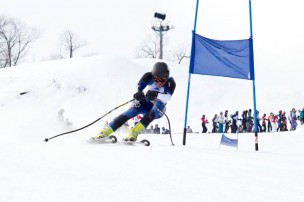
c/o Wesleyan Ski Team
To make it onto Wesleyan’s ski and snowboard teams, you don’t even need to know how to make it down the mountain.
“We are a smattering of raced-since-age-five or never-raced-before, so our policy is if you want to come to a race, you can come,” said ski team Co-Captain Adam Freed ’14. “We are not exclusive. You can come to one race or you can come to five races. It’s really just about getting out there, skiing, having fun, and keeping it cheap for all the athletes.”
Freed leads the men’s ski team along with junior captain Michael Creager ’15, and Marika Soltys ’14 leads the women’s ski team. The snowboarding team, captained by Dylan Penn ’15, and the ski teams hit the slopes together often.
Alex Heyison ’15 had no experience in snowboarding until last year’s Ski Week at Jay Peak in northern Vermont. He learned over the course of five days; right after that, he began competing in races.
“I learned on the race course, which was a painful but very efficient way of learning,” Heyison said. “I got to watch all the other snowboarders go down and I tried to mimic them as best as I could.”
This is only the second year for Wesleyan’s five-person snowboarding team, yet the team is the largest in the division. Under Penn’s leadership, the team will advance to Nationals this year in Lake Placid, NY over spring break.
“If you think about it, snowboarding as a sport has only been around for 15 to 20 years, and racing has only caught on in the last five,” Freed said. “Wesleyan has a chance to show that it should be considered more of a popular sport.”
Wesleyan’s ski team has been around a bit longer than the snowboarding team—approximately 10 to 15 years, according to Freed’s estimate—and boasts a team of about 20 people. This year, both the men’s and women’s ski teams are in first place in the McBrine division of the United States Collegiate Ski Association, guaranteeing them a spot at Regionals in Sugarloaf, Maine this weekend.
Despite its successes, the team doesn’t take itself too seriously.
“The last race of the year is always a costume race,” Freed said. “Last year, we dressed up in thrift shop theme and I actually skied down the racecourse with a boom box, playing the song ‘Thrift Shop.’”
But is fun on the slopes worth skipping what Wesleyan has to offer on the weekends?
“I don’t feel like I’m for a second missing out,” Chris Delaney ’14 said. “And it makes the spring even more special.”
Dan Brugioni ’15 said the ski and snowboarding team has a social atmosphere of its own; besides, the entire season is only five weekends long.
“The Wesleyan social scene is very stagnant,” Brugioni said. “It’s kind of the same thing in the winter, a lot of the same places, a lot of the same people. But ski team brings a lot of different people together, and you get to leave campus for a little bit.”
The ski and snowboarding teams also make an effort to socialize with the other teams in the league, including those from Yale University, Brandeis University, and the University of Rhode Island.
“It’s super collaborative; we even have a Facebook thread [where] a lot of the captains…talk,” Freed said.
This collaboration is especially vital because the team does not have a formal coach.
“Chris Delaney, myself, and Michael Creager are the people with the most race experience, and we do all the coaching,” Freed said.
This year is the first that the team has had in-season ski training, which usually occurs on Tuesday evenings at Mount Southington, about a 20-minute drive from campus.
Increased time on the mountain can also make the threat of injuries more evident, although according to Freed, the team has luckily been spared of incidents in the past few years. Just in case, the team members include EMTs, like Creager and Lucy Finn ’14.
“Last year, we had a girl on another team dislocate her knee on course, and Mike [Creager] was the one to respond before ski patrol even got there,” Freed said. “What my coach used to say to me was, if you feel like you are in control, you are not skiing fast enough. Crashes happen a lot, but if you are worried about crashing, that is when you get hurt.”
According to Delaney, who Freed predicts will likely win the individual standings for men’s racing this year, the possibility of injury is simply part of the sport.
“If being successful is ever going to be on the plate, injuries are in the mix,” Delaney said.
Ultimately, Freed stressed that the team’s biggest strength is its cohesiveness as a unit.
“I couldn’t ask for a better team,” Freed said. “Even after the season ends, I’ve noticed people become friends and still hang out. They call Marika Soltys and I, ‘Mom and Dad.’”
Just because the ski team is closely knit doesn’t mean members don’t have hopes for more recruits.
“We are looking to extend the family,” Delaney said.
Comments are closed